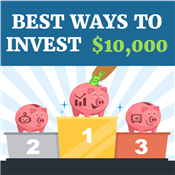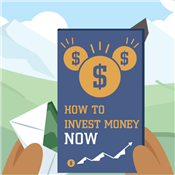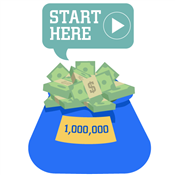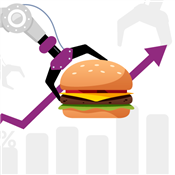How to Make a Million Dollars
Making a million dollars is hard, before it is easy. Here are practical steps to get started.
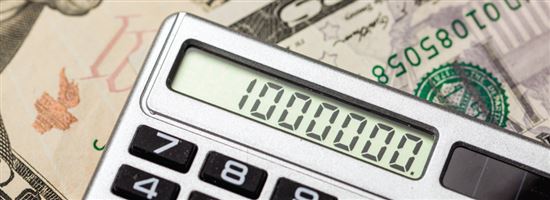 |
Remember, when you were a kid, and a million dollars seemed like a vast sum of money? Like, the most money anyone could possibly make or need? Well, we're all grown up now, and while a million dollars is still a lot of money, it isn't out of reach.
- College Is Not Required
- But If You Do Choose College…
- Don't Rely on Student Loans
- Maintain a Budget
- Pay Yourself First
- Create an Emergency Fund
- Look at the Big Picture
- Invest Early
- Invest Regularly
- Avoid Debt
- Borrow Cheaply
- Change Jobs
- Get a Side Hustle
- Pick the Right Partner
- Pick the Right Friends
- Have Free Fun
- Don't Buy More Than You Need
- Take Care of Your Health
- Bank "Extra" Money
- Now, Onto Your Next Million!
College Is Not Required
A college education can be a great thing, but getting a degree is not a requirement for making a million dollars. The first thing to consider is whether or not you're "college material."
Many high schools and parents push kids toward college, whether or not they may be suited for it. What happens? The kid might spend a few semesters in college and then drop out, but not before spending thousands of dollars or taking out thousands of dollars in student loans that have to be paid back whether he or she graduated or not.
Not being suited for college has nothing to do with a person's intelligence or abilities. Some people just aren't cut out for college, just as some people are not cut out to be chefs or doctors or teachers. Just not for them.
There are plenty of well-paying careers that don't require a college degree. If you don't want to go to college, don't waste your time and money. And college isn't going anywhere. If you have a change of heart and you do want to attend college one day, you can! No rule says only 18-year-olds can enroll.
But If You Do Choose College…
 |
It would be great if we could go to college, major in a subject that we're really passionate about, graduate, and make a good living working in the field our degree is in. But that isn't realistic. If you're going to invest four or more years and tens (or hundreds) of thousands of dollars in a college degree, you need to choose a major that will give you a return on that investment.
That said, don't choose to major in something you have absolutely no interest in just because jobs in that field pay well. You don't want to spend your whole working life doing something you don't enjoy at all. There is a happy medium where your career may not be your absolute passion, but you do get some enjoyment from your work.
This isn't to say you can never pursue a field you love. If you play your cards right, you can work for a few decades, retire decades before the traditional retirement age of 65, and go back to school and start a whole new career that you do love. And you don't have to worry about how much it pays because you've already made enough money to be set for life! Not a bad trade-off!
Don't Rely on Student Loans
College is expensive. The average cost of a 4-year degree is about $122,000. These averages, though, are based on taking four years to graduate. Only 39% of students graduate in 4 years. Almost 60% of undergrads take six years to get their 4-year degrees.
There are plenty of ways to lower college expenses and ways to pay for it so that you don't graduate with five or six-figure debt:
- Apply for as many scholarships you possibly can when starting your senior year in high school. You don't have to have a perfect GPA to win a scholarship. There are plenty of scholarships that are awarded on things other than grades. Even if a scholarship is only worth a few hundred dollars, that's a few hundred dollars you don't have to borrow and pay interest on. And a few small scholarships can add up.
- Go to a community college for the first two years when you're taking your prerequisites. Community colleges offer much lower tuition rates, and you can save on room and board by living at home. Once you're ready to start taking classes for your major, you can transfer to a 4-year institution.
- Attend college in-state. In-state tuition is much lower than out of state.
- Attend a public college as they have lower tuition rates than private colleges.
- Attend college part time and work part time. It takes longer to get your degree, but an extra year or two is worth it to save thousands of dollars because your job allows you to pay your tuition in cash.
The average amount of debt people graduate with after earning their bachelor's degree is $35,000. Starting your adult life with debt means you will have to delay growing your wealth, which hampers your efforts to make a million dollars.
Maintain a Budget
 |
A budget isn't something only people who have to watch every penny should have. A budget shows you where you're spending your money and how much money you're spending. Pretty vital information for anyone, I'm sure we can all agree!
Creating and maintaining a budget isn't hard. I can show you how to do it with just two things:
- Mint: Mint is free budgeting software. It's easy to set up, and once you've set it up, the program does most of the work for you. It pulls in your financial transactions and categorizes them automatically.
- 50/30/20 Budgeting: This is a simple, effective way to budget your money. You budget 50% of your net (after-tax) income on essentials like housing, utilities, groceries, etc. Budget 30% of your net income for discretionary expenses like dinners out, vacations, entertainment, etc. And the final 20% of your net income goes toward your financial goals—things like paying off debt, saving for an emergency fund, and investing.
People think budgeting is this big, complicated process, but it really is just as simple as these two things!
Pay Yourself First
Paying your rent or mortgage is a priority, right? You wouldn't blow your housing money on dinners out or clothes, right? Of course not, because you have to have a place to live. That is the mindset you should bring to your financial goals, the 20% in the 50/30/20 budget. Budgeting money for these goals is just as important as budgeting money for housing.
Create an Emergency Fund
 |
The money in an emergency fund is money for things like a necessary car or home repair, a medical or dental expense, or to see you through a period of unemployment. This money can prevent things like running up credit card debt, paying late fees on utilities and other bills, losing insurance coverage, and any number of other things that can be catastrophic to your finances.
How much should be in your emergency fund? At the very least, $1,000. That amount will get you through most minor emergencies. Ideally, 3-12 months' worth of essential expenses, the things you must pay and cannot cut like housing, utilities, groceries, etc.
That's a lot of money, to be sure, but I think we can all see how important having a big emergency fund is given recent events.
Look at the Big Picture
Saving any amount of money is always a good thing, but saving a dollar here and five dollars there is not on the list of how to make a million dollars. If you want to save an impactful amount of money, concentrate on your most significant expenses.
For most of us, that is housing and our vehicle. The rule of thumb is to keep your housing costs at or below 30% of your net income. So if you net $3,000 a month, your rent or mortgage should cost no more than $1,000 a month. For your vehicle, it should be at or below 10%. So using our same example, your vehicle payment should be no more than $300 per month.
If you can spend less than 30% on housing and 10% on your vehicle, even better.
Invest Early
 |
This is a big one. The earlier you invest, the more time your money has to grow. That's the beauty of compound interest. Here's a simple example. You invest $100, making 7% (a conservative average return over the long term) a year. The following year, you earn 7% on $107 and have $114.49. And so on.
These amounts don't look like much, but when you invest larger amounts over decades, it's incredible how much your money will grow. You want to see how to make a million dollars? I plugged some numbers into a compounding interest calculator. Let's take a look:
- Initial investment: $1,000
- Monthly contribution: $500
- Years invested: 40
- Annual return: 7%
- Total investment: $240,000
- Result: $1,212,785.13
Pretty impressive! Our total contribution was less than a quarter of a million dollars, just $6,000 a year, but we ended up with more than one million dollars.
Now, let's make a "small" change:
- Initial investment: $1,000
- Monthly contribution: $1,000
- Years invested: 20
- Annual return: 7%
- Total investment: $240,000
- Result: $495,815.59
We started with the same $1,000 investment, doubled our monthly contribution, but only invested for half as many years, 20 rather than 40. We invested the same amount of money, $240,000, but we earned $716,969.60 less!
There is no substitute for time when it comes to investing. This is the calculator I used. It's a fun little tool. If you need an incentive to start investing, play around with some numbers yourself.
Invest Regularly
As you can see from our example above, we were investing every single month for decades. When it comes to how to make a million dollars, the only thing second to investing early is investing regularly.
The best and easiest way to do this is to automate it. Examples are participating in your employer's 401(k) program if one is offered. The money is deducted from your paycheck and invested before it hits your bank account. Another is to set up automatic transfers from your checking account to a robo-advisor.
Avoid Debt
Debt is often the biggest obstacle on the road to how to make a million dollars.
Not all debt is inherently bad.
If you took out a federal student loan (federal loans have a lower interest rate than private loans) to pay for college and your degree enabled you to get a good-paying job, that isn't bad debt (although there are ways to avoid some or all student debt as discussed above).
If you took out a mortgage to buy a duplex so you can live in one half and pay your mortgage by renting out the other half, that mortgage is not bad debt (mortgage interest is often relatively low).
When I tell you to avoid debt, I mean bad debt, high-interest debt, which for most of us, is credit card debt. Let's use another calculator that will be much less fun than the last one to see the impact of credit card debt.
- Balance: $1,000
- Annual interest rate: 16% (this is average, rates vary)
- Minimum payment percentage: 2% (this is typical for many cards)
- Minimum payment: $20 per month (this is 2% of our $1,000 balance)
Based on these numbers:
- Total interest charges: $658.89
- Number of monthly payments: 83
- Total number of years: 6.9
Read it and weep. We paid almost as much in interest as we charged on the card, and it took us nearly seven years to pay it off. This is why it's crucial to avoid high-interest debt. Remember the average return we were getting when we were investing our money? It was 7%, and the average interest rate on a credit card is more than double that, 16%. Stay out of credit card debt!
Know How to Prioritize
You may have multiple financial goals, and knowing how to prioritize them can help you reach them faster. Everyone's priority list will look a bit different, but some things are universal. Typically paying off high-interest debt is top of the list, but there are two exceptions.
Build a $1,000 emergency fund. Having this money can save you from falling even further into credit card debt or worse, payday lender debt (which can have triple-figure interest rates) if you've maxed out your cards.
Contribute enough to your 401(k) plan to get the matching funds. Not all employers offer a 401(k), and not all that do offer to match. But if your employer offers a 401(k) and matching, that is free money. Literally free money. And we never turn that down!
After those two things have been achieved, paying off high-interest debt should be your sole focus. Once that is done, you can focus on:
- Growing a fully funded emergency fund.
- Investing for retirement. These accounts, like IRAs and 401(k)s, have yearly maximum contribution limits, and you should strive to meet them. This is the money you will live on after you retire, so you want to fully fund these accounts and give them years to grow.
- Investing for educational expenses if you choose to have children and fund their education.
- Non-tax advantaged investments (ETFs, individual stocks, real estate, etc.).
- Paying off low-interest debt.
Borrow Cheaply
Most of us cannot pay cash in full for a big purchase like a home. We have to borrow money in the form of a mortgage. So you want to get the best interest rate whenever you borrow money because we saw above how costly high-interest rates really are.
The way to get the lowest interest rate from a lender is to have a credit score of 760 or above. If you don't know what your credit score is, most credit card companies offer it for free, as do sites like Credit Karma or Credit Sesame. These sites will also suggest ways to improve your credit score.
The internet has been a great thing for saving money on interest. In the past, if you needed to borrow money, you had to go to the banks or credit unions in your area. If you lived in a small town, your options were really limited, and maybe you didn't even have more than one option.
But thanks to the internet, we can shop around for the best rates on things like personal loans, debt consolidation loans, student loan refinancing, mortgages, and more. Enter some basic information, and you can see terms from several different lenders and then choose the best offer for you.
Change Jobs
If you want to grow your income steadily, change jobs frequently. The average raise is about 3%, but when you move from one company to another, you can boost your income by 10%-20%! You should always keep your resume up to date and take every opportunity you can to network with others in your field who might be able to help you land that next, higher-paying job.
Get a Side Hustle
We spend a lot of time in front of a screen, be it watching TV, reading stuff on the internet, or playing video games. Use some of that time to bring in some extra money. This is another great thing the internet has given us—many flexible ways to earn a few extra bucks.
A side hustle can be lots of things; driving for a rideshare service, renting out your home on Airbnb, renting out your car when you're not using it, selling your lesson plans, starting an affiliate marketing site, and good old-fashioned hustles like babysitting, dog walking, or mowing lawns.
Most side hustles require little to no startup costs, and many allow you to work when it's most convenient for you. Even if your side hustle only brings in an extra one or two hundred dollars a month, it adds up. See for yourself—go back to the calculator we used to see how investing early is so powerful, add an extra $100 or $200 to your monthly contribution number, and see the difference.
And if you should lose your job, like so many people have in 2020, even having a little money coming in can make a big difference.
Pick the Right Partner
If you and the person you share your life with don't share the same values when it comes to money, not only is it likely to cause conflict between you, it's probably going to make it a lot harder to reach your financial goals. You can disagree on many issues and still have a successful relationship and life, but money is not one of those issues.
Before you join your life and your finances with someone, make sure you are both on the same page regarding things like saving, spending, and investing. Divorce is expensive in more ways than one.
Pick the Right Friends
You don't mingle money with friends, but having friends who share your money values can help you make sound financial decisions.
We've all had that friend who seems to spare no expense when they go out or are on vacation—whether they can afford it or not (and we may not know the truth of their financial situation).
It's hard not to try to "keep up with the Jones" when we're with them. And they may cheer you on when you talk about buying a car you can't afford or taking a vacation you can't afford rather than giving you sensible advice like, "Are you crazy!? Don't DO that!"
Your friends don't need to be in the same tax bracket as you, but if most of your friends have a healthy money mindset, it can help you stick to your budget and reach your financial goals.
Have Free Fun
Having fun doesn't have to cost much or any money. If you want to go out and have some fun, look for those things. Too often, we fall back on things like going out to dinner, shopping, seeing a movie, or a concert when we're looking to have a fun time, but that gets expensive.
I'm by no means saying never spend money to have fun, just make sure that every fun thing you do doesn't cost a pretty penny.
Don't Buy More Than You Need
Did you know that a $10,000 used car (that is in good repair) will get you to the same destination just as safely and in the same amount of time as a brand new $50,000 car? And did you also know that you can live just as perfectly comfortable and happy a life in a small, affordable house as a big McMansion that requires a jumbo mortgage? It's true!
Do you have a closet bursting with clothes? Do something for me. Go into that closet, take out everything you haven't word in 6 months, and put it on the bed. I'll wager that it's a big pile. Most people tend to wear the same handful of outfits, no matter how many closets they've filled with clothes.
Don't buy more than you need, whether it's a car, a house, a wardrobe, or anything else.
Take Care of Your Health
Being in poor health in the U.S. is expensive. Even if you have insurance, it typically doesn't cover all medical expenses.
If you want to know how to make a million dollars, staying healthy is one of the best ways to do it. It can be hard to see, though, because a lot of times you have to spend money to stay healthy. Nutritious food, regular medical and dental care, early treatment so a minor problem doesn't turn into a major one. Those things cost money.
But consider this. A study found that for every $1 spent on public health, $5.60 is saved on healthcare costs. Those numbers are for public health spending, but it's not hard to extrapolate similar results in our own lives and for our own spending. Saving money can be a false economy, and cheaping out on things that keep you healthy and well are an example.
Bank "Extra" Money
You took my advice, changed jobs, and earned yourself a 15% income boost—congratulations! Or maybe you worked really hard this year and were rewarded with a nice bonus. Great, you deserve it! What are you going to do with that money?
If you want to know how to make a million dollars, the answer is "bank" it. You can spend a little on yourself. We all deserve to enjoy the fruits of our hard work sometimes. But most of this kind of "extra" money (raises, bonuses, tax refunds, etc.) should go toward helping you to achieve your financial goals. So use it to pay down high-interest debt, build your emergency fund, or invest.
Now, Onto Your Next Million!
If you follow the really excellent advice (if I do say so myself) this article has provided, your first million dollars is just the start. Making a million is well within your reach. And the first million is the hardest. After that, the sky is the limit!
Write to Candice E at feedback@creditdonkey.com. Follow us on Twitter and Facebook for our latest posts.
|
|
|
